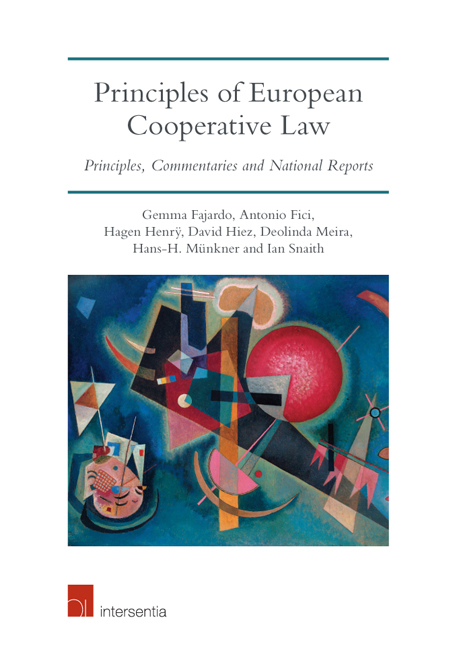Book contents
- Frontmatter
- Foreword
- Contents
- List of Abbreviations
- Introduction
- Part I Principles of European Cooperative Law and Commentaries
- Chapter 1 Definition and Objectives of Cooperatives
- Chapter 2 Cooperative Governance
- Chapter 3 Cooperative Financial Structure
- Chapter 4 Cooperative Audit
- Chapter 5 Cooperation Among Cooperatives
- Part II National Reports
- About the Authors
Chapter 3 - Cooperative Financial Structure
from Part I - Principles of European Cooperative Law and Commentaries
Published online by Cambridge University Press: 22 September 2018
- Frontmatter
- Foreword
- Contents
- List of Abbreviations
- Introduction
- Part I Principles of European Cooperative Law and Commentaries
- Chapter 1 Definition and Objectives of Cooperatives
- Chapter 2 Cooperative Governance
- Chapter 3 Cooperative Financial Structure
- Chapter 4 Cooperative Audit
- Chapter 5 Cooperation Among Cooperatives
- Part II National Reports
- About the Authors
Summary
(1) As private legal persons that carry on an economic activity without profits as the ultimate purpose, cooperatives have a specific financial structure aimed at the success of their objectives, with respect to universally recognised cooperative values and principles.
(2) As business organisations, cooperatives can use shares, reserves, loans and other financial instruments as sources of capital, providing they are compatible with their cooperative nature.
COMMENTARY
Cooperatives have a distinct financial structure, as shown below.
The social object of the cooperative, closely linked to its mutualistic vocation, makes it compulsory that the cooperative‘s financial structure be aimed at promotion of the interests of cooperator members, i.e. at meeting their economic, social and cultural needs. Indeed, unlike commercial companies, cooperatives conduct an economic activity whose aim is not primarily profit but has a mutualistic purpose (see sec. 1.1). However, as outlined in chapter 1, the mutualistic purpose pursued by cooperatives does not mean that they conduct their activity exclusively with their members, since they may also engage in non-member cooperative transactions (see sec. 1.5) which will have consequences on their financial structure.
The financial structure of cooperatives is thus based on a particular logic resulting not only from the specific characteristics of the cooperative objective but also from the necessary obedience to cooperative values and principles. Cooperatives develop their social object in an organised and professional manner, and, like business organisations, they need to use various management and financial instruments to enhance their efficiency in achieving their goals. To this end, according to the Principles of European Cooperative Law (PECOL), cooperatives can use shares, reserves, loans, and other financial instruments as sources of capital provided that these are compatible with their cooperative nature.
(1) Cooperatives are established without minimum capital, unless the law or cooperative statutes provide otherwise.
(2) Cooperative statutes may fix a minimum share capital and the minimum amount and nature of the contribution of each member, with respect to the principle of open membership as laid down in sections 1.3(6) and 2.2.
(3) In any case, the share capital is variable, which means that variations in the amount of the capital, due notably to increased or reduced membership, do not require amendments of the cooperative statutes nor disclosures.
- Type
- Chapter
- Information
- Principles of European Cooperative LawPrinciples, Commentaries and National Reports, pp. 73 - 96Publisher: IntersentiaPrint publication year: 2017
- 3
- Cited by



